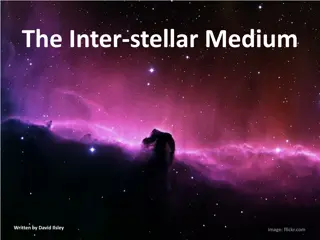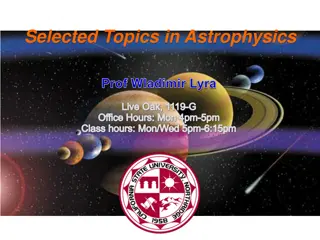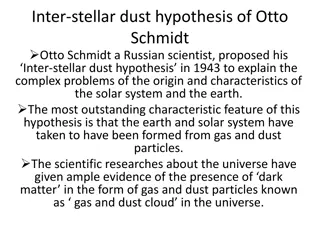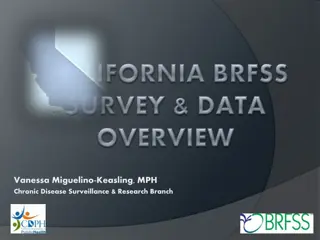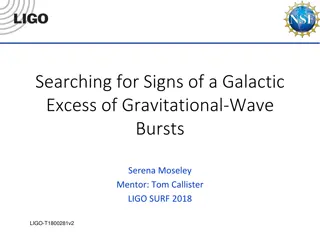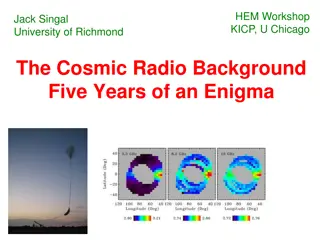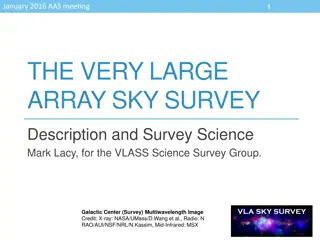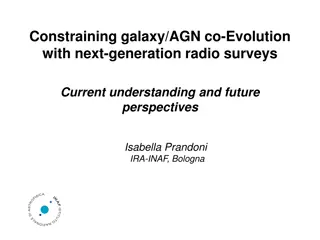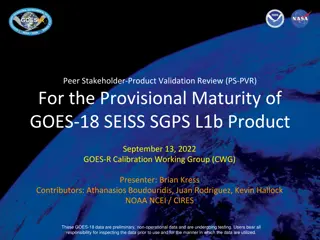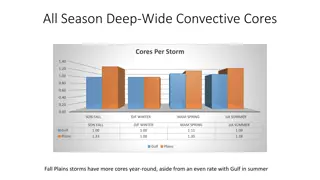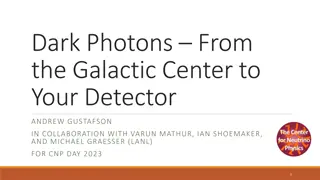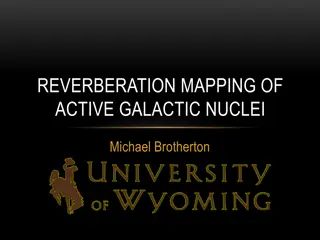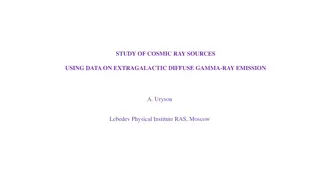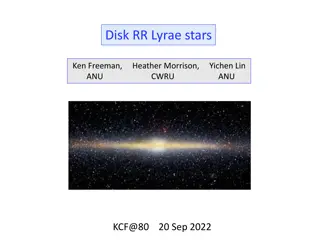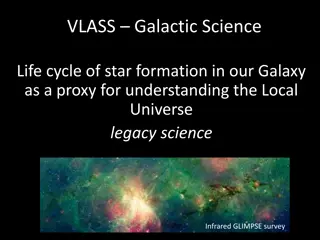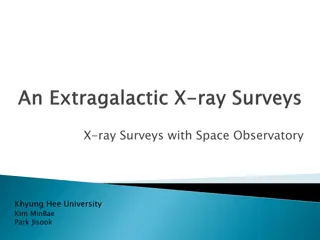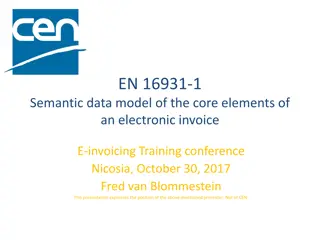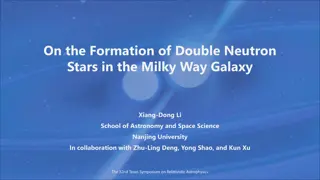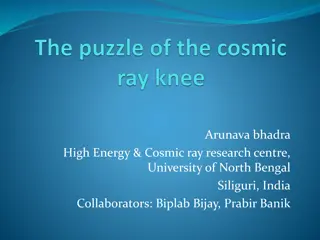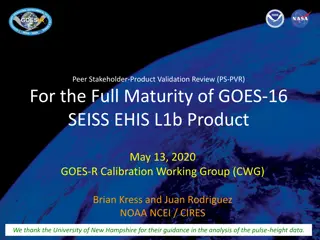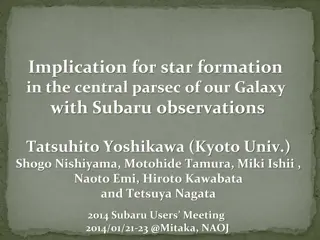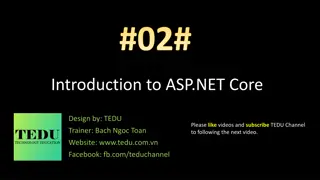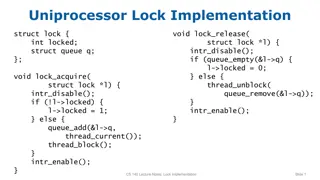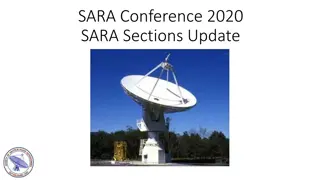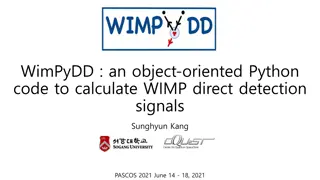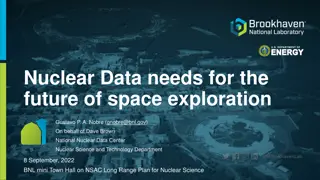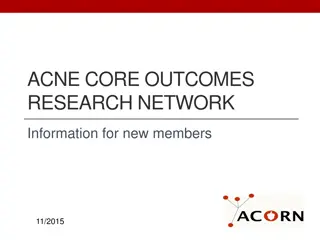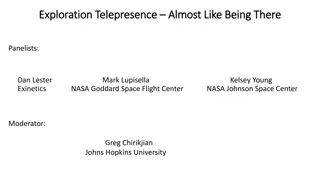Understanding AGN Jet Production Efficiency: Insights from Spin and Magnetic Flux
A fundamental question in astrophysics is how efficiently active galactic nuclei (AGN) produce jets. Black hole spin and magnetic flux play crucial roles in determining the jet production efficiency. High-spin values and large magnetic flux threading are essential for generating high-efficiency jets
2 views • 22 slides
Understanding Terrestrial Planets and Core Dynamics
Exploring the core-mantle interaction from the early Hadean period to present times reveals intriguing questions about the outer core's electrical conductivity, geodynamo sustainability, and inner core characteristics. Studies indicate challenges in maintaining the geodynamo, potential heat sources
9 views • 48 slides
Evolution of the Universe: From Big Bang to Galactic Recycling
380,000 years after the Big Bang, the Universe transitioned from a plasma to a gas, leading to the formation of atoms. Gravity caused gas clumps to form galaxies, stars, and other celestial bodies. The life cycles of stars play a crucial role in recycling material back into the inter-stellar medium,
1 views • 38 slides
Exploring Fascinating Topics in Astrophysics
Delve into intriguing subjects like Galactic Rotation Curves, Mass to Luminosity Ratio, Low Surface Brightness Galaxies, Dark Matter Haloes, and the Bullet Cluster. Discover how observations and Big Bang nucleosynthesis help us understand dark matter in the universe.
1 views • 10 slides
The Interstellar Dust Hypothesis of Otto Schmidt Explained
Russian scientist Otto Schmidt proposed the Interstellar Dust Hypothesis in 1943 to explain the origin of the solar system and Earth. According to this hypothesis, gas and dust particles from the universe formed our solar system. The dark matter in the form of gas and dust clouds played a crucial ro
3 views • 5 slides
Overview of BRFSS Survey and its Core Components
The Behavioral Risk Factor Surveillance System (BRFSS) is a state-based telephone survey that monitors personal health behaviors in non-institutionalized adults. It collaborates with the CDC and all 50 U.S. states to gather data on various health topics. The survey includes fixed core questions on d
0 views • 18 slides
Overview of CUPE Local 3550's Response to Anti-Union Legislation
A detailed overview of Bill 32, an anti-union legislation affecting Canadian Union of Public Employees (CUPE) Local 3550, which requires categorization of dues into core and non-core, with members opting in for non-core spending. The local has reviewed its budget, confirming it is 100% core, and emp
0 views • 14 slides
Recertification and Assessment of Core Curriculum Courses
The Core Curriculum Council of the Faculty Senate presents a process for recertification and assessment of core curriculum courses to maintain integrity and quality. Courses must be recertified every four years to ensure consistency amidst changes in instructors, content, and teaching methods. State
0 views • 33 slides
Unveiling Galactic Excess in Gravitational-Wave Bursts
Investigate the presence of a galactic source emitting gravitational waves within the LIGO frequency range and develop techniques to detect and identify these signals. Employ simulations to differentiate between isotropic and galactic event distributions, aiming to enhance our understanding of the o
0 views • 30 slides
The Cosmic Radio Background: Unraveling an Enigma
Delve into the mysteries of the cosmic radio background through discussions on isotropic radio skies, Galactic monopoles, extragalactic components, and limitations on magnetic fields. Explore the complexities of synchrotron emissions and their implications in understanding the universe.
3 views • 21 slides
VLASS Sky Survey and Galactic Science Highlights
The January 2016 AAS meeting discussed the VLASS Sky Survey, highlighting survey parameters, science drivers, and the potential for new discoveries in galactic science. Key topics included multiwavelength imaging, Faraday tomography, AGN and galaxy evolution studies, and the search for exotic system
2 views • 9 slides
Co-Evolution of Galaxies and AGN with Next-Gen Radio Surveys: Insights and Prospects
Understanding the co-evolution of galaxies and active galactic nuclei (AGN) through next-generation radio surveys is crucial for advancing astrophysical knowledge. These surveys offer a comprehensive view of star formation, AGN activity, and AGN feedback mechanisms. The quest for multi-band informat
0 views • 18 slides
Enhancing Alignment Between Introductory Biology and Core Courses
Explore the alignment of the Biology core curriculum, focusing on the structure, goals, and rationale behind flipping portions of the curriculum. Evaluate the preparedness of students for core courses, identify gaps, redundancies, and essential knowledge transfer. Study design involves categorizing
0 views • 25 slides
GOES-18 SEISS Solar Galactic Proton Sensor Product Validation Review
GOES-18 SEISS SGPS L1b product is undergoing provisional maturity testing by the GOES-R Calibration Working Group. The review includes evaluation of product quality, supporting instruments, health tests, and path to full validation. Users are responsible for inspecting and utilizing the preliminary
0 views • 39 slides
Analysis of Seasonal Variations in Gulf Plains Convective Cores
The analysis reveals fascinating insights into Gulf Plains convective cores, showcasing variations in core numbers, average pixels per storm, pixels per core, and core sizes across different seasons. Deep-Wide cores dominate in the summer, while Gulf cores are larger in the fall. The study sheds lig
1 views • 4 slides
Unveiling Dark Matter Mysteries Through Dark Photons
Delve into the exploration of dark matter through the lens of dark photons in the galactic center and detectors. Uncover the enigmatic nature of dark matter, its interactions, existing constraints, and our model with fermionic dark matter and a dark photon mediator. Discover strategies to evade cons
0 views • 18 slides
Understanding Active Galactic Nuclei and Black Hole Mass Measurements
Exploring active galactic nuclei (AGN) through reverberation mapping techniques to measure black hole masses, observing AGN schematics, ultraviolet-optical AGN spectra, and methods for measuring masses in space. Delve into the current understanding of AGN fields, the future prospects, and ongoing re
0 views • 30 slides
Exploring Cosmic Ray Sources Using Gamma-Ray Emission Data
This study focuses on investigating ultrahigh energy cosmic ray (UHECR) sources by analyzing extragalactic diffuse gamma-ray emission data. Techniques such as examining UHECR mass composition and arrival directions, as well as studying interactions with cosmic microwave and extragalactic background
0 views • 16 slides
Galactic Alliance Mission: Advanced Energy Vehicle for Remote Planetary Operations
Team F presents their Advanced Energy Vehicle project for the Galactic Alliance's mission to transport R2D2 units on remote planets efficiently. The project focuses on energy management, operational efficiency, and consistency while overcoming challenges like limited power supply. Learn about the te
0 views • 14 slides
Metal-Rich Field RR Lyrae Stars and Galactic Evolution
Metal-rich field RR Lyrae (RRab) stars, distinct from cluster RR Lyrae stars, play a significant role in Galactic evolution due to their unique characteristics. With periods around 0.4 to 1 day, these old stars with sawtooth light curves are found to have a disk-like distribution and kinematics. The
0 views • 24 slides
Exploring Star Formation and Stellar Phenomena in Our Galaxy
Delve into the fascinating realms of high mass star formation, stellar winds, planetary nebulae, and active stars through the VLASS Galactic Science project. This initiative leverages cutting-edge surveys like GLIMPSE and CORNISH to unlock the secrets of star birth, evolution, and their impact on th
0 views • 8 slides
Exploring the Universe: X-Ray Surveys with Space Observatory
Delve into the fascinating world of X-ray surveys conducted by the Space Observatory at Khyung Hee University. Learn about the significance of X-ray surveys in detecting emission from hot regions of the Universe, minimizing errors in redshift measurements, extending the sample to higher redshifts, a
0 views • 16 slides
Achieving Mission Fulfillment Through Core Themes: An Update
In 2016, our college established four core themes to represent its mission at the core. These themes - Academic Transfer, Career & Technical Education, Essential Skills, and Lifelong Learning - serve as indicators to gauge our progress towards fulfilling our mission. Currently, we are performing abo
0 views • 18 slides
Semantic Data Model of Electronic Invoicing Core Elements
Presentation by Fred van Blommestein on the EN16931-1 semantic data model of core elements in electronic invoicing, covering invoice processes, core invoice design, semantic model details, business rules, and invoicing principles. The model includes 160 elements in 33 groups, with mandatory elements
0 views • 13 slides
Properties of Ionized Outflows in MaNGA DR2 Galaxies
The evolutionary path of galaxies is marked by gas reservoirs that fuel star formation and feed supermassive black holes, influenced by feedback processes such as galactic outflows. This study analyzes ionized outflows in MaNGA DR2 galaxies, focusing on data samples, spectral fitting, and sample sel
0 views • 15 slides
Insights on Double Neutron Star Formation in Our Galaxy
Detailed examination of the formation of double neutron stars in the Milky Way Galaxy, exploring various merging channels, uncertainties in binary evolution, and models compatible with gravitational wave observations. Emphasis on testing and constraining models with Galactic double neutron stars.
0 views • 18 slides
Understanding Cosmic Ray Research: The Mysterious Knee in the Energy Spectrum
The energy spectrum of cosmic rays displays a unique power law behavior with distinct features such as the knee and the ankle. The knee, observed at around 3 PeV, marks a change in the spectral index. Various theories have been proposed to explain the origin of the knee, with suggestions ranging fro
0 views • 70 slides
Review of GOES-16 SEISS EHIS L1b Product Maturity
This review focuses on the Peer Stakeholder-Product Validation for the full maturity assessment of the GOES-16 SEISS EHIS L1b Product. It includes an overview of the EHIS, anomalies, resolution status, and recommendations. The Energetic Heavy Ion Sensor aims to measure solar energetic particles and
0 views • 50 slides
Implications of Star Formation in the Central Parsec of Our Galaxy with Subaru Observations
Researchers presented implications of star formation in the central parsec of our Galaxy using Subaru observations at the 2014 Subaru Users Meeting. The study focused on the supermassive black hole Sgr A* and the challenges posed by conditions in the Galactic Center for star formation. Various scena
0 views • 30 slides
Understanding ASP.NET Core: Features, Ecosystem, and Differences
ASP.NET Core is a modern framework for building web applications with cross-platform capabilities. It offers a leaner and modular approach compared to ASP.NET Framework. With support for both .NET Core and full .NET Framework, ASP.NET Core enables developers to create applications that can run on Wi
0 views • 9 slides
Lock Implementation Strategies for Single-Core and Multi-Core Systems
The provided content outlines several lock implementation strategies for both single-core and multi-core systems. It covers the structures, functions, and techniques used to manage locks efficiently, including releasing locks, acquiring locks, and handling synchronization. Different versions of lock
0 views • 6 slides
Advanced Emission Line Pipeline for Stellar Kinematics Analysis
This comprehensive pipeline includes processes for stellar kinematics, continuum fitting, Gaussian line fitting, and analysis of SAMI-like cubes. It also covers Gaussian fitting techniques, parameter mapping, and potential issues. The pipeline features detailed steps and strategies for accurate anal
0 views • 10 slides
SARA Conference 2020 Sections Update and Initiatives
The SARA Conference 2020 Sections Update presents a detailed agenda focusing on the purpose, organization, volunteering opportunities, section coordinators, and collaboration with various organizations. The update emphasizes structuring SARA similar to other national and professional organizations,
0 views • 10 slides
Object-Oriented Python Code for WIMP Direct Detection Signals
Calculating signals for Weakly Interacting Massive Particle (WIMP) direct detection using an object-oriented Python code called WimPyDD. WimPyDD provides accurate predictions for expected rates in WIMP direct detection experiments within the framework of Galilean invariant non-relativistic effective
0 views • 24 slides
Nuclear Data Needs for Future Space Exploration
The future of space exploration requires extensive nuclear data for shielding against Galactic Cosmic Rays (GCR) that pose challenges due to their high energy. Transport codes like FLUKA, PHITS, and GEANT4 play crucial roles in simulating shielding applications. There is a need for comprehensive dat
0 views • 7 slides
Journey to the Earth's Layers
The Earth's structure consists of four main layers: the crust, mantle, outer core, and inner core. The crust is the thin, rocky layer we see on the surface, while the mantle is a solid layer that flows like a viscous liquid. The outer core is a hot, melted layer of iron and nickel, and the inner cor
0 views • 10 slides
Core Review and Alignment Committee Updates
The Core Review and Alignment Committee established in 2021 at WSU is diligently evaluating the existing core requirements, aligning them with learning outcomes, and addressing issues such as student transfers, distinctiveness of the core, and student recruitment and retention efforts.
0 views • 13 slides
ACORN Core Outcomes Research Network Overview
ACORN (ACNE CORE OUTCOMES RESEARCH NETWORK) was established in July 2013 with the aim of creating a standardized set of core outcome measures for use in acne clinical trials. Led by key individuals such as Diane Thiboutot, Jerry Tan, and Alison Layton, ACORN focuses on global representation, stakeho
0 views • 10 slides
Exploration Telepresence: Advancements in Space Mission Concepts and Human-Robotic Development
Delve into the world of space exploration telepresence with panelists Dan Lester, Mark Lupisella, and Kelsey Young, as they discuss their groundbreaking work in galactic star formation, human exploration systems, and geological sciences. Learn about their contributions to NASA's strategic roadmaps,
0 views • 8 slides
System of Environmental-Economic Accounting Core Tables for Water
System of Environmental-Economic Accounting (SEEA) provides core tables and accounts focusing on water accounting and other environmental aspects. The core tables offer concise and relevant information essential for deriving indicators and formulating evidence-based public policies. These tables aim
0 views • 15 slides


